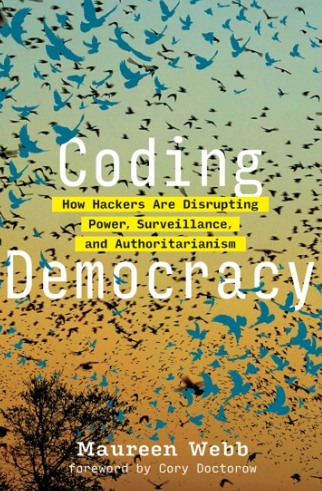Meadowhawk@bookwyrm.social reviewed Coding Democracy by Cory Doctorow
String start.. took em awhile to go back and finish
3 stars
Great history of Hackers ,but about half way through it seems to loose focus.
How Hackers Are Disrupting Power, Surveillance, and Authoritarianism

416 pages
English language
Published Nov. 11, 2021 by MIT Press.
Hackers as vital disruptors, inspiring a new wave of activism in which ordinary citizens take back democracy. Hackers have a bad reputation, as shady deployers of bots and destroyers of infrastructure. In Coding Democracy , Maureen Webb offers another view. Hackers, she argues, can be vital disruptors. Hacking is becoming a practice, an ethos, and a metaphor for a new wave of activism in which ordinary citizens are inventing new forms of distributed, decentralized democracy for a digital era. Confronted with concentrations of power, mass surveillance, and authoritarianism enabled by new technology, the hacking movement is trying to “build out” democracy into cyberspace. Webb travels to Berlin, where she visits the Chaos Communication Camp, a flagship event in the hacker world; to Silicon Valley, where she reports on the Apple-FBI case, the significance of Russian troll farms, and the hacking of tractor software by desperate farmers; to Barcelona, to meet …
Hackers as vital disruptors, inspiring a new wave of activism in which ordinary citizens take back democracy. Hackers have a bad reputation, as shady deployers of bots and destroyers of infrastructure. In Coding Democracy , Maureen Webb offers another view. Hackers, she argues, can be vital disruptors. Hacking is becoming a practice, an ethos, and a metaphor for a new wave of activism in which ordinary citizens are inventing new forms of distributed, decentralized democracy for a digital era. Confronted with concentrations of power, mass surveillance, and authoritarianism enabled by new technology, the hacking movement is trying to “build out” democracy into cyberspace. Webb travels to Berlin, where she visits the Chaos Communication Camp, a flagship event in the hacker world; to Silicon Valley, where she reports on the Apple-FBI case, the significance of Russian troll farms, and the hacking of tractor software by desperate farmers; to Barcelona, to meet the hacker group XNet, which has helped bring nearly 100 prominent Spanish bankers and politicians to justice for their role in the 2008 financial crisis; and to Harvard and MIT, to investigate the institutionalization of hacking. Webb describes an amazing array of hacker experiments that could dramatically change the current political economy. These ambitious hacks aim to displace such tech monoliths as Facebook and Amazon; enable worker cooperatives to kill platforms like Uber ; give people control over their data; automate trust; and provide citizens a real say in governance, along with capacity to reach consensus. Coding Democracy is not just another optimistic declaration of technological utopianism; instead, it provides the tools for an urgently needed upgrade of democracy in the digital era.
Great history of Hackers ,but about half way through it seems to loose focus.
The books starts with a (very readable) history hacking but then turns into a series of meeting minutes. Conversations and events are described in excruciating detail. Every meeting the author is described which can distracting. Eventually even the Italian five-star movement is mentioned (in pages and pages of conversations). But it never becomes clear how this is relevant for a book titled "coding democracy". Most of the stuff about the European political movement is not about hacking at all. In the end it left me wondering what point the author was trying to make.